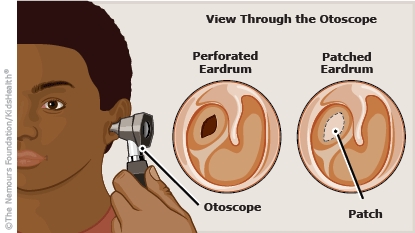Your child will need to rest as the ear heals from surgery, but can return to most activities after several weeks.


Tympanoplasty is an operation to repair the eardrum and middle ear. When working properly, the eardrum and bones of the middle ear (called the ossicles) help to carry sound to the brain. But a hole in the eardrum or problem with the ossicles can interfere with hearing or may cause pain. In a tympanoplasty, the surgeon patches a damaged eardrum and also may repair the ossicles in order to restore hearing, prevent repeat infections, or treat pain.
Some vomiting in the first hours after the surgery is normal. Also, the surgery may temporarily affect your child's sense of hearing, balance and taste. Bloody drainage from the ear is to be expected for the first few days.



Your child:

Your child: